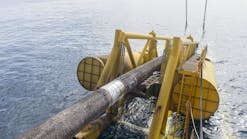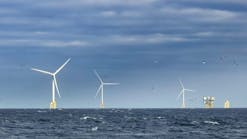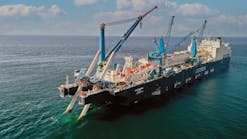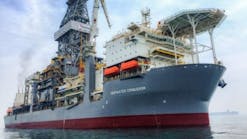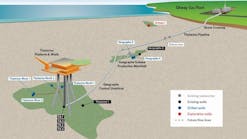Bruce Beaubouef • Houston
Drilling requests for the Gulf of Mexico are picking up after the moratorium was lifted, says the International Energy Agency (IEA).
“Oil companies are queuing up to submit requests to recommence drilling, including many of those previously active in the area,” the IEA said in a report issued in mid-November. “Companies remain keen to work in the Gulf of Mexico, seeing it as one of the more profitable regions accessible to them.”
US President Barak Obama halted oil and natural gas drilling in waters deeper than 500 ft (152 m) after BP’s Macondo well blew out April 20, killing 11 workers and setting off the biggest oil spill in US history. The new rules will add $183 million a year to the cost of drilling on the outer csontinental shelf, the Interior Department said in an Oct. 14 notice in theFederal Register.
The rules will add $1.42 million in costs for each new deepwater well that uses a floating rig, the department predicts. Shallow-water wells could cost an extra $90,000.
Oil production in the Gulf for 2010 will be 60,000 boe/d and 100,000 boe/d in 2011, lower than earlier forecasts, the IEA said. The first permits could be granted before the end of the year and the question remains what this will mean for production volumes, the Paris-based agency said.
The rules are aimed at tightening workplace safety on offshore rigs and beefing up standards for equipment. Chief executive officers will have to certify that their companies comply with the regulations. Drillers will have to provide third-party verification that blowout preventers are properly designed and can stand up to pressure under all conditions.
Offshore operators remain optimistic about the Gulf. On Oct. 21, Chevron approved a $7.5-billion plan to develop oil and gas fields in the GoM. And Royal Dutch Shell says it expects to produce 220,000 b/d of next year in the Gulf.
Suit on drilling rules set for trial
A New Orleans judge will conduct a two-day bench trial next year in an oil industry lawsuit which claims that U.S. regulators are continuing to stall deepwater drilling in the Gulf of Mexico.
According to a Bloomberg report, U.S. District Judge Martin Feldman recently held a closed-door meeting with lawyers in three lawsuits challenging the Obama administration’s offshore drilling policy. After the meeting, the judge said that he would try two of the cases next year in New Orleans federal court.
“Trial will commence on Monday, July 25, 2011, at 9 a.m. without a jury,’’ Feldman said in a order handed down Nov. 9 regarding a suit brought by Ensco Offshore Co. against the administration’s second drilling ban.
Feldman also said he would conduct a separate two-day bench trial Oct. 11 on remaining claims in a separate industry lawsuit against the first U.S. drilling ban, which President Barack Obama imposed in May after theDeepwater Horizon/Macondo oil spill.
That lawsuit, by Hornbeck Offshore Services LLC, was joined by the state of Louisiana and more than 200 regional business and trade groups, who claimed that U.S. Interior Secretary Kenneth Salazar improperly restricted exploration in waters deeper than 500 ft. Feldman struck down the initial ban in late June, calling it overly broad and punitive to the Gulf Coast economy.
After Feldman struck down the first moratorium, Salazar ordered a second one in July, saying regulators needed more time to study improvements to drilling safety and oil spill response capabilities. In October, Salazar rescinded the second ban, saying the industry was meeting milestones for improving drilling safety and that the sealing of BP’s runaway well on Sept. 19 had freed up oil spill response capacity.
In his November ruling, Feldman threw out Ensco’s claims against the second ban, finding that the latest rules lifting the moratorium rendered the lawsuit moot. Feldman earlier ruled that drilling safety rules Salazar issued along with the first ban in May should be scrapped as well.
This leaves Ensco’s claims that the U.S. is using its new rules, including allegedly unlawful permitting requirements, to block the industry from resuming drilling in the deepwater Gulf.
In the other lawsuit, led by Hornbeck, the trial will consider industry allegations that regulators are interfering with oil company leases and exploration contracts, according to court filings.
Apache completes Mariner Energy merger
Apache Corp. says it has completed its merger with Mariner Energy. The merger closed on Nov. 10 following its approval by Mariner’s stockholders and subsequent completion of documentation. Apache issued approximately 17.5 million shares of its common stock and paid approximately $800 million in cash to Mariner stockholders.
Apache also assumed Mariner’s debt with current fair value of approximately $1.6 billion. As a result of the merger, former Mariner stockholders own approximately 5% of Apache’s outstanding shares of common stock. At a special meeting, 79% of Mariner’s stockholders voted to approve the merger.
The Mariner Energy merger is expected to provide Apache Corp. with a rich inventory of growth opportunities for years to come, including Mariner’s deepwater portfolio of 125 blocks and more than 50 prospects. Photo courtesy Apache Corp.
“The Mariner merger – along with our $7-billion acquisition of BP’s upstream operating regions in the Permian basin, Canada, and Egypt, and our earlier $1 billion acquisition of Devon’s Gulf of Mexico Shelf assets – will provide Apache with a rich inventory of growth and value-enhancement opportunities for years to come,” said G. Steven Farris, Apache’s chairman and CEO.
At year-end 2009, Mariner had estimated proved reserves of 181 MMboe (47% liquid hydrocarbons) in the Gulf shelf and deepwater, onshore Gulf Coast, Permian basin, and unconventional onshore plays, as well as unbooked resource potential of 2 Bboe. Mariner’s deepwater portfolio includes 125 blocks, seven discoveries in development – including interests in the world-class Lucius and Heidelberg discoveries – and more than 50 prospects. During the third quarter, Mariner produced 51,348 boe/d.
Offshore Articles Archives
View Oil and Gas Articles on PennEnergy.com


